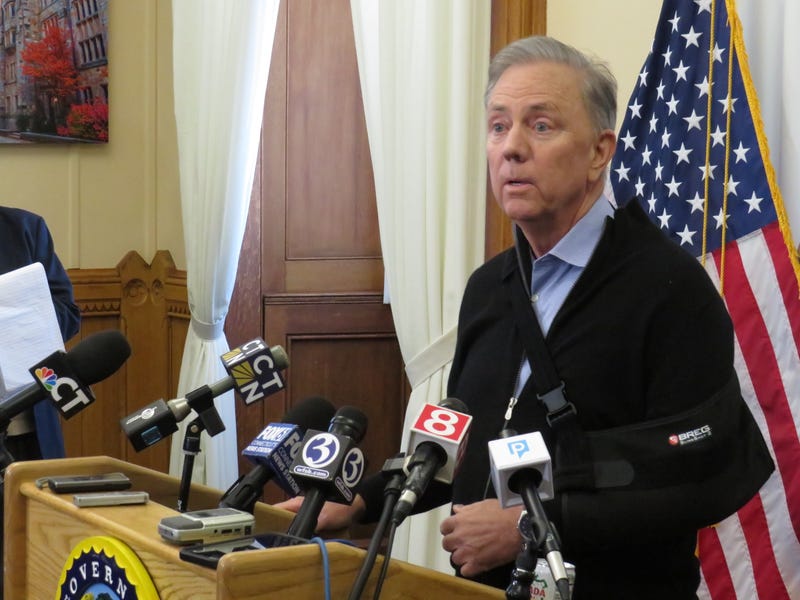
Just back from a trade mission to India--with his freshly broken left arm in a sling after a fall in the shower--Gov. Ned Lamont is arm-wrestling fellow Democrats over spending.
He’s issued two line-item vetoes blocking allocations he says would exceed the state’s spending cap for the current fiscal year. Both face possible override votes as soon as Wednesday.
“I think it’s the wrong way to budget,” said Lamont at a Monday afternoon Capitol press conference. “’Buy it now, pay later, we’ll figure out how we’re going to do it:’ That’s just the type of budgeting that got this state into the ditch over the last twenty years.”
One veto blocks $2.8 million for non-profits facing federal cuts, a plan primarily backed by Democrats. The other veto would wipe out $40 million in special education funding for local districts struggling with rising costs, a plan overwhelmingly approved by lawmakers from both parties.
The governor says both allocations have merit, but fiscal concerns take precedence:
“You’ve got to start with an honestly balanced budget, and I’m not going to compromise on that. That’s been my north star for five years. We’ve done it, and I think that it’s made a difference.”
Saying the spending would not violate the state’s fiscal guardrails, Senate Democratic leaders Martin Looney and Bob Duff are sharply critical of the special ed veto:
“Let’s be clear: this funding is about our support for education right now. Not in 2026, not in 2027. Right now, the state has the resources to afford this investment in our children, and right now, our towns need this funding.”
Connecticut Education Association President Kate Dias agrees, asking the governor to reconsider:
“This money was a lifeline, not a luxury, for students with disabilities who are already being short-changed by an underfunded system… Connecticut is one of the wealthiest states in the country, with a $356.4 million budget surplus—yet the governor is choosing to deny funding to students who need it most. That is unacceptable.”
Most Republican lawmakers also voted in favor the special ed funding, and they’re considering whether to join Democrats in their override attempt.
“The facts that have been presented to us right now are that this money does not subvert the caps,” says Rep. Joe Polletta (R-Watertown).
“I appreciate that Governor Lamont now wants to meet with legislators to tackle the urgent challenge of skyrocketing special education costs, but his timing is like a basketball coach drawing up a game plan in the fourth quarter—when his team is already down by 30,” said House Minority Leader Vin Candelora (R-North Branford). “That’s exactly where we are. Municipalities are under immense financial pressure to cover costs as the fiscal year winds down.”
